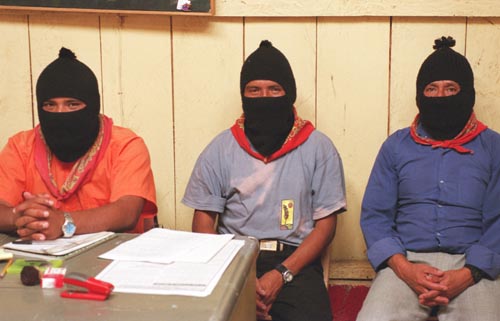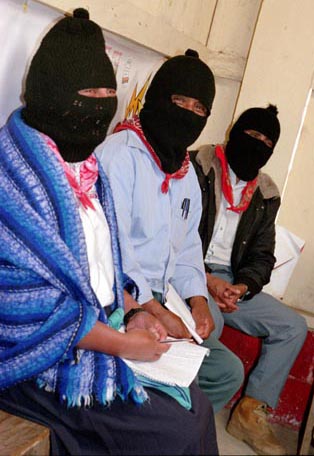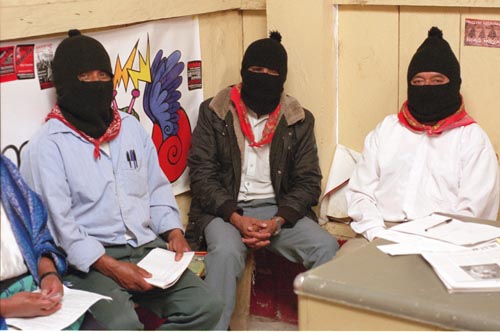Interview with the Zapatistas
Zinco & Guido | 31.12.2004 17:19 | Globalisation | Social Struggles | Zapatista | World




Q.- How early in the struggle did you realise the importance of a media project?
A.- We decided at an early stage to have a project of this kind. It was one of the points raised at the “San Andres Talks” between the EZLN and the federal government a few years ago. We raised the point that the indigenous people (the Zapatista people) also had the right to be represented in the media, because we the indigenous had been aware for a long time that we were being excluded, we never had the right to access their media There we expressed our need and right to have access to the media. We have never had the right to access the mainstream media or to have our own. We wanted the people in power to know it is our right to have them and were determined to build our own. Communication is important to everyone not only to the rich and powerful.
Q.- Do you feel your media projects play a role in the organisation and communication between the communities?
A.- Yes, we think that it has helped, people from other countries had come and ask about our struggle, then they had comeback with magazines, papers, books, we send all these to the communities, and they can see that other peoples share their views and support their fight.
For us radio is an important and interesting medium, it’s been very useful in advising the communities and also to communicate between them. It helps not only Zapatista communities but also other communities. People tend to listen to radio programs in their length, and thus they learn about our ideology and struggle, it’s helping many people understand the causes of our struggle. Because we are indigenous we are mainly illiterate, the vast majority can’t read the newspapers, but they have helped the ones that can read to learn and to know about the general situation within our region, our people and the rest of the nation.
Q.- How important is the Zapatista media for communicating and raising the profile of the struggle with the outside world?
A.- The radio has also play an important role on that, we receive letters from people from many other countries telling us that they are listening to Radio Insurgente, it gives us a voice. We as Zapatistas always wanted to spread our voice and before Radio Insurgente we didn’t have the means. We found that broadcasting in FM didn’t reach many people, sometimes broadcasting in AM reaches further but it was broadcasting on the internet that has helped us reach many more, nationally and internationally.
We want everybody to know what is happening here in Chiapas and about the EZLN, our media projects have helped us to reach every continent, it has represented a big advance for us.
******************************************
Q.- Do you feel that your struggle has spread to new communities in the past few years?
A.- For what we see right now our organisation is advancing all the time, there are more communities that listen and are interested in what we do, in the struggle of the EZLN; we can see the EZLN is winning the interest of many more people; Mexicans know about us since the armed uprising in 1994 and many people in non Zapatista communities have taken an interest on us. For us this in an advance in our organisation , we want to organise more peasants, although there are many that still don’t listen, but it is a slow process.
In the last ten years of our armed uprising we have extend considerably in different communities, in different municipalities and states of the nation. We see we have grown. In 1994 we were a few communities, now we are formed by hundreds of communities, thousands of people. Many people have understood the causes of our struggle, what are the demands and goals of the EZLN.
Q.- What kind of repression are the Zapatistas presently experiencing from the Mexican government and its agents?
A.- Since the massacre in Acteal in 1997, the local and federal government have move lots of soldiers and PGR forces permanently in many municipalities. Close to this ‘Caracol’ we are surrounded by federal soldiers from the army base in San Andres de “(missed the name) “, in the autonomous municipality of Poloh there are about 15 army bases and PGR forces doing daily surveillance, that’s what we see from the government.
The government has always tried to hinder our work and every project we have, that’s why they have increased the number of soldiers and army bases around us, also in the communities there are paramilitary groups that are constantly seeking confrontation between people, between brothers and colleagues, they are constantly looking at making trouble and confrontation between peasants, that’s the tactic of the paramilitaries helped by the government.
We also experience aerial surveillance, the plains fly low over the communities to see what we are doing, it is a way of intimidate and provoke us, but all this soldiers, paramilitaries and provocations are not going to stop us, our work or our projects, we’ll keep going ahead.
FOR MORE INFO ABOUT THE ZAPATISTAS AND THEIR MEDIA PROJECT GOTO:
www.radioinsurgente.org
At the end of the interview we were granted permission to visit the School and Hospital at Oventic to interview the staff about the challenges they are facing.
(the words and pictures above are subject to copy write but available for free to non profit organisations/publications/websites etc. To use contact:
 guidoreports@riseup.net )
guidoreports@riseup.net )
Zinco & Guido
 e-mail:
guidoreports@riseup.net
e-mail:
guidoreports@riseup.net